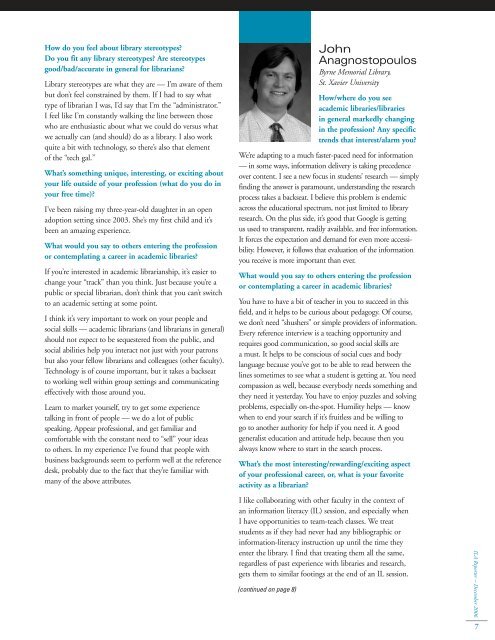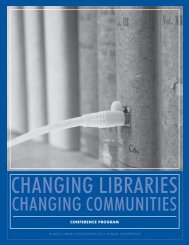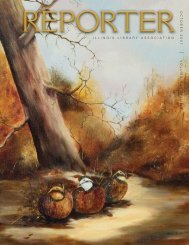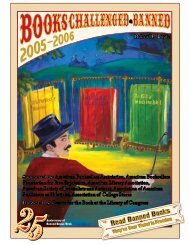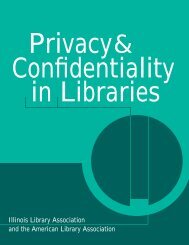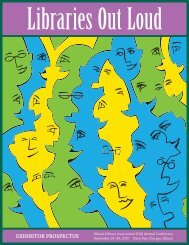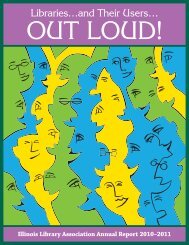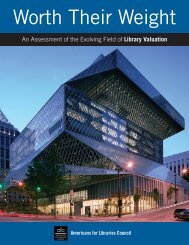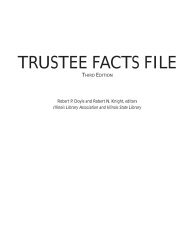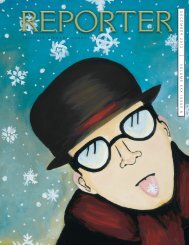December 2006 - Illinois Library Association
December 2006 - Illinois Library Association
December 2006 - Illinois Library Association
Create successful ePaper yourself
Turn your PDF publications into a flip-book with our unique Google optimized e-Paper software.
How do you feel about library stereotypes?<br />
Do you fit any library stereotypes? Are stereotypes<br />
good/bad/accurate in general for librarians?<br />
<strong>Library</strong> stereotypes are what they are — I’m aware of them<br />
but don’t feel constrained by them. If I had to say what<br />
type of librarian I was, I’d say that I’m the “administrator.”<br />
I feel like I’m constantly walking the line between those<br />
who are enthusiastic about what we could do versus what<br />
we actually can (and should) do as a library. I also work<br />
quite a bit with technology, so there’s also that element<br />
of the “tech gal.”<br />
What’s something unique, interesting, or exciting about<br />
your life outside of your profession (what do you do in<br />
your free time)?<br />
I’ve been raising my three-year-old daughter in an open<br />
adoption setting since 2003. She’s my first child and it’s<br />
been an amazing experience.<br />
What would you say to others entering the profession<br />
or contemplating a career in academic libraries?<br />
If you’re interested in academic librarianship, it’s easier to<br />
change your “track” than you think. Just because you’re a<br />
public or special librarian, don’t think that you can’t switch<br />
to an academic setting at some point.<br />
I think it’s very important to work on your people and<br />
social skills — academic librarians (and librarians in general)<br />
should not expect to be sequestered from the public, and<br />
social abilities help you interact not just with your patrons<br />
but also your fellow librarians and colleagues (other faculty).<br />
Technology is of course important, but it takes a backseat<br />
to working well within group settings and communicating<br />
effectively with those around you.<br />
Learn to market yourself, try to get some experience<br />
talking in front of people — we do a lot of public<br />
speaking. Appear professional, and get familiar and<br />
comfortable with the constant need to “sell” your ideas<br />
to others. In my experience I’ve found that people with<br />
business backgrounds seem to perform well at the reference<br />
desk, probably due to the fact that they’re familiar with<br />
many of the above attributes.<br />
John<br />
Anagnostopoulos<br />
Byrne Memorial <strong>Library</strong>,<br />
St. Xavier University<br />
How/where do you see<br />
academic libraries/libraries<br />
in general markedly changing<br />
in the profession? Any specific<br />
trends that interest/alarm you?<br />
We’re adapting to a much faster-paced need for information<br />
— in some ways, information delivery is taking precedence<br />
over content. I see a new focus in students’ research — simply<br />
finding the answer is paramount, understanding the research<br />
process takes a backseat. I believe this problem is endemic<br />
across the educational spectrum, not just limited to library<br />
research. On the plus side, it’s good that Google is getting<br />
us used to transparent, readily available, and free information.<br />
It forces the expectation and demand for even more accessibility.<br />
However, it follows that evaluation of the information<br />
you receive is more important than ever.<br />
What would you say to others entering the profession<br />
or contemplating a career in academic libraries?<br />
You have to have a bit of teacher in you to succeed in this<br />
field, and it helps to be curious about pedagogy. Of course,<br />
we don’t need “shushers” or simple providers of information.<br />
Every reference interview is a teaching opportunity and<br />
requires good communication, so good social skills are<br />
a must. It helps to be conscious of social cues and body<br />
language because you’ve got to be able to read between the<br />
lines sometimes to see what a student is getting at. You need<br />
compassion as well, because everybody needs something and<br />
they need it yesterday. You have to enjoy puzzles and solving<br />
problems, especially on-the-spot. Humility helps — know<br />
when to end your search if it’s fruitless and be willing to<br />
go to another authority for help if you need it. A good<br />
generalist education and attitude help, because then you<br />
always know where to start in the search process.<br />
What’s the most interesting/rewarding/exciting aspect<br />
of your professional career, or, what is your favorite<br />
activity as a librarian?<br />
I like collaborating with other faculty in the context of<br />
an information literacy (IL) session, and especially when<br />
I have opportunities to team-teach classes. We treat<br />
students as if they had never had any bibliographic or<br />
information-literacy instruction up until the time they<br />
enter the library. I find that treating them all the same,<br />
regardless of past experience with libraries and research,<br />
gets them to similar footings at the end of an IL session.<br />
(continued on page 8)<br />
ILA Reporter – <strong>December</strong> <strong>2006</strong><br />
7


